Bearded dragons sleep a lot (more frequently and longer) than normal due to abrupt environmental changes, anxiety or stress, illness, inappropriate tank temperatures, unsuitable lighting arrangements, improper UVB levels, or dehydration. Then again, your bearded dragon might be sleeping so much because of malnutrition, impaction, shedding, they’re still young, or gearing up for brumation.
In most cases, adapting the bearded dragon’s artificial habitat to the recommended optimal conditions leads to normal sleeping patterns in beardie pets. Nevertheless, in some cases such as illness, your pet might require qualified reptile veterinarian assistance to resolve the underlying issue and restore normal bearded dragon’s sleep cycle.
1. Abrupt Environmental Changes
Environmental factors around a bearded dragon play a monumental role in the pet’s growth, comfort, and overall life. Thus, making drastic changes to the lizard’s habitat affects your lizard in numerous ways and sleeping a lot is one of the most obvious symptoms.
Changing a beaded dragon’s habitat abruptly puts the lizard in an unfamiliar environment. Consequently, the lizard might develop relocation stress which in turn makes the pet sleep excessively.
Along with sleeping so much, relocation stress often causes a pet bearded dragon to be lethargic and lose their appetite. Moreover, baby beardies are more susceptible to this kind of stress and can take up to two weeks to recover.
Fortunately, excessive beardie sleep resulting from relocation stress is easy to resolve. Simply provide an environment that’s conducive for your beardie pet to relax and adapt to their new habitat.
Ensure the surroundings resemble the lizard’s natural habitat with multiple hiding spots. On top of that, feed the pet with sufficient amounts of correctly balanced diets for their age and minimize handling until the lizard is comfortably settled.
Further, you can help your recently adapted pet beardie to drive out relocation stress and revert to their normal sleep cycle by:
- Providing appropriate lighting and heating arrangements and cycles in and around the beardie’s tank
- Keeping loud and unfamiliar noises away from the beardie
- Keeping other bearded dragons, pets, and creatures away from your beardie’s tank
- Handling your pet gently and giving them periodic warm baths and massaging them on their head and belly.
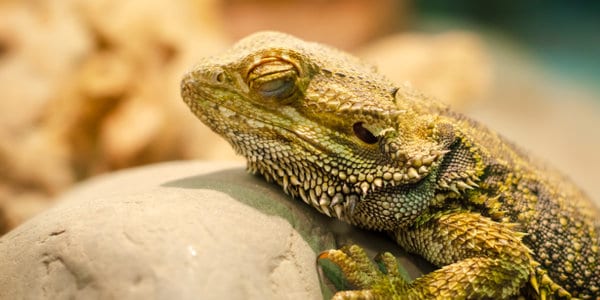
2. Anxiety or Stress
Anxiety and stress are among the most common reasons for pet bearded dragons sleeping a lot. Typically, anything that makes a beardie’s stay in their tank uncomfortable potentially causes aggression or anxiety.
In turn, your beardie pet becomes stressed out to a level they resort to sleeping a lot to escape the stressful elements inn their habitat.
The most common causes of stress in captive beardies include unhygienic living conditions, loud noises, unsuitable tank size, inappropriate tank temperature, insufficient hiding places, presence of other animals in or near the beardie’s tank, and handling your pet more than they’re comfortable with.
Along with sleeping a lot, a stressed bearded dragon might display the following symptoms:
- Abnormal fatigue (lethargy)
- Reduced physical activity and too much hiding
- Excessive restlessness
- Reduced basking
- Lose of appetite
- Panicky pacing around the tank
- Foul-smelling poop
- Stress marks especially on the belly.
Dealing with excessive beardie pet sleep resulting from stress is straightforward- just eliminate the stress-causing factor and your beardie will thankfully resume their normal sleep patterns.
Ensure their habitat is healthy by keeping their enclosure clean, use the correct size of tank for your beardie, maintain the recommended tank temperatures, and provide multiple hiding spot for your pet.
Moreover, keep other pets and animals away from your beardie’s cage to avoid agitating or scaring your pet and only handle the lizard when they’re comfortable with petting to prevent undue stress and the resultant excessive sleeping.
3. Illness
An ill bearded dragon sleeps excessively not only at night but also during the day. Sicknesses in bearded dragon pets can come from a variety of sources although the most common are parasitic attacks, poor diets, and unhygienic living conditions.
Whatever the cause, illnesses sap out a beardie’s energy levels and cause them to sleep excessively in addition to other symptoms. For instance, parasites consume part of a beardie’s nutrients and cause malnutrition which in turn might result in your bearded dragon sleeping so much.
Apart from excessive sleeping, bearded dragon illnesses can cause a range of other symptoms such as:
- Swollen joints
- Loose or watery poop
- Low energy levels
- Reduced or lost appetite for food or water
- Weight loss
- Diarrhea or failure to poop for long
- Runny nose
- Watery eyes
- Symptom of stress such as excessive hiding, lethargy, beard-puffing, hissing, excessive panting, and mouth-gaping.
Possibly the best way to deal with illness-bred excessive sleep in a bearded dragon pet is by taking your lizard to the vet.
A reptile pet vet performs fecal or blood tests to determine whether your beardie has parasites or diseases. Afterward, they provide the right antibiotic medication to treat the illnesses.
This is worth noting: Even new and baby bearded dragons that you adapt right from the breeder or pet store could potentially be carrying parasites and diseases.
Thus, the first thing you should do is first take them to the vet for examination, vaccination, and treatment. Luckily, most beardie parasites and illnesses are easy to treat if you spot them early.
On the other hand, bearded dragon parasites and diseases can cause severe health complications, organ damage, and even death if they’re ignored or not addressed in time.
So, it’s best to do your ultimate to keep your beardie pet free of parasites and diseases instead of waiting to treat the menace later.
Make a habit of washing and disinfecting your hands before and after handling your beardie to avoid passing on disease vectors such as parasites, bacteria, fungi, viruses and other pests between you and your bearded dragon and other pets.
Nevertheless, beardies often exhibit similar signs when undergoing brumation, shedding, or when suffering from an illness. Thus, it’s sometimes confusing to rule out precisely what’s causing your beardie pet to sleep so much.
Still, monitoring your beardie for some time and seeking veterinarian assistance is your best bet at identifying and resolving the problem.
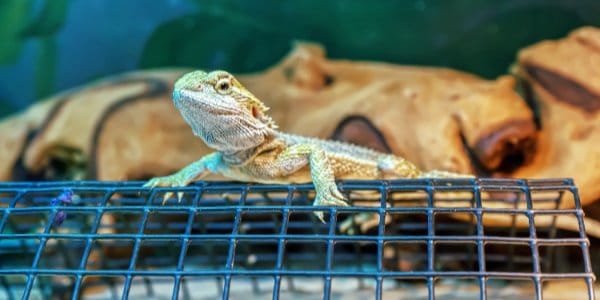
4. Inappropriately Low Tank Temperatures
Unsuitable tank temperatures are a common reason for a bearded dragon pet sleeping excessively during the day. Like other reptiles, beardies are cold-blooded animals that depend on the temperature of their surroundings to regulate their own body temperature. Moreover, the temperature influences bearded dragons sleeping habits and eating.
When the temperatures inside a beardie’s tank rise, the pet’s metabolic activities proceed at a faster rate and the lizard becomes more active. On the other hand, as the temperatures drops, the beardie slows down in various body processes and becomes generally less active.
A bearded dragon tank that’s too cold makes it hard and sometimes impossible for the pet to digest food and absorb nutrients, bask, maintain normal physical activity, and stay adequately healthy.
The lizard might also wrongly presume that it’s winter and start preparing for brumation by slowing down on eating and other physical activities.
Moreover, extremely cold beardie tanks can cause lethargy and constipation in a beardie and deteriorate their appetite to a level they stop eating. As a result, your pet’s energy levels drop substantially and they eventually start losing weight and appearing frail.
On top of that, persistent cold temperatures can weaken a beardie’s immune system, causing them to be more susceptible to constant illnesses. Ultimately, a beardie’s enclosure whose temperatures stay below the recommended optimal readings for too long generally affects your pet’s health and behavior negatively.
Fortunately, there’s hope for a bearded dragon that’s sleeping excessively due to unsuitable tank temperatures. You can correct the situation by maintaining the recommended beardie tank temperatures at their optimal levels.
Along with that, it’s recommended to use a thermostat along with a handheld digital thermometer to monitor and maintain the right temperatures at the basking, cooling, and general areas of your pet’s enclosure.
Probably the best thing to remember here is that the basking area for a baby beardie should stay between 100-100° Fahrenheit (38-43° C) while that of an adult beardie is recommended at 105° Fahrenheit (41° C).
On top of that, the hiding and cooling spots in the tank should stay between 70-85° Fahrenheit (21-29° C) while the general enclosure area should be kept at approximately 90° degrees Fahrenheit (32° C) for baby and adult beardie pets alike.
But that’s not all. You can also maintain the recommended beardie tank temperatures using suitable heat emitters for bearded dragons.
Apart from purchasing reliable emitters for your beardie, ensure they’re of the right heat and electrical rating. Along with this, switch the emitters on and off at the proposed time cycles to sufficiently warm up your beardie and their habitat.
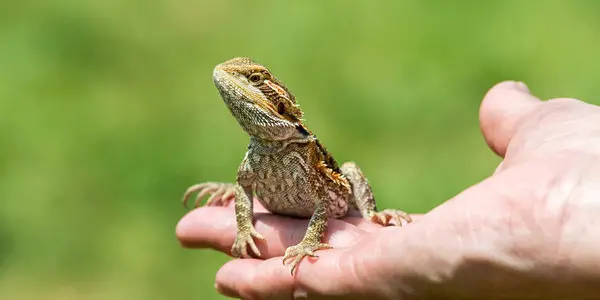
5. Unsuitable Lighting Arrangements and Cycles
We’ve already established that a bearded dragon is naturally active at night and slumbers at night. However, inappropriate lighting setups and lighting cycles can offset your beardie pet’s sleeping patterns and make the lizard to sleep more at some times.
For instance, if your beardie tank’s lighting cycle is off the track and the lights stay on at night, you’ll realize that your pet tends to sleep more during the day.
This is only typical beardie response as the lizard is sleeping a lot more than normal during the day to recover the hours of sleep they lost at night when the lights were ablaze.
Generally, captive bearded dragons need around 10 to 12 hours of sleep daily to stay happy, active, and healthy. Therefore, keeping the lights late into the night will most surely deprive your reptile pet of their sleep. In turn, they’re more likely to sleep a lot more than usual during the day to catch up on the missed sleep.
Furthermore, the external lighting around a bearded dragon’s tank also play a crucial role in determining the pet’s sleeping cycles. This is why most beardies tend to be sleepier on cloudy or dark days than on bright days. Thus, you should ensure your beardie pet’s terrarium is correctly lit both inside and outside.
6. Improper UVB Levels and Exposure
Understanding the natural habitat of bearded dragons can help you to provide conditions ideal for a caged beardie pet to thrive. In their normal wild habitats in the Australian desert and woodlands, bearded dragons love basking in the hot dry sun. Besides the warm soothing comfort, the sun provides many health benefits to a beardie.
Likewise, beardies in captivity need sufficient exposure to sunlight to survive and thrive. The lizards absorb the light’s UVB rays to derive vitamin D3 which in turn fosters the absorption of calcium and other essential minerals and nutrients.
Unfortunately, a beardie tank hardly gets sufficient exposure to UVB rays from natural sunlight due to deflection and blockage by the tank walls and other barriers. Therefore, it’s up to you to provide your beardie with a UVB source to supplement natural sunlight.
Inadequate UVB exposure limit the amount of vitamin D3 a beardie receives and depresses the absorption of valuable nutrients such as calcium.
Consequently, the beardie suffers malnutrition and may suffer multiple health-related complications such as general body weakness, compromised immune system, weight loss, lethargy, and often sleeps a lot more than normal.
Luckily, installing a suitable specialized UVB lamp in addition to lighting and heating lamps provides the right amount of UV exposure to a captive beardie. Typically, UVB bulbs deteriorate over time and mostly need replacement after six months.
So, if your beardie has recently been sleeping excessively and you haven’t replaced their UVB lap for a long time, your pet might not be receiving the level of UVB exposure they need to stay healthy and active.
Besides installing appropriate UVB lamp in your beardie’s tank, ensure you switch on the lamp on for the right stretch of time to provide sufficient UVB exposure.
However, don’t leave the lamps indefinitely on as excessive UVB exposure is also detrimental to a beardie’s health. An easy way to maintain this balance painlessly is using an automated timer to turn the lamp on and off.
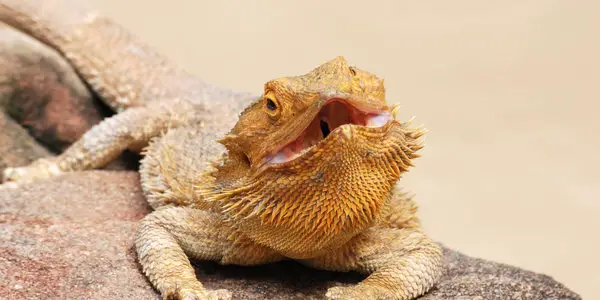
7. Dehydration
If your bearded dragon pet has recently started sleeping more than usual, dehydration might be responsible for the sudden turn in behavior. Dehydration is more prevalent in captive bearded dragons than their wild friends for two main reasons:
- Naturally, beardies take in water by licking dew and moisture drops and drinking from rivers unlike the stagnant water in a captive beardie’s water bowl.
- The food you feed to your pet beardie might contain insufficient water and unsuitable tank’s living conditions (high temperatures, low moisture level, and insufficient hides) could be causing your lizard to lose water fast and eventually get dehydrated
Moreover, baby bearded dragons aged between 0-3 months are at a heightened risk of dehydration than their elder counterparts. Typically, a dehydrated bearded dragon tends to be less active and sleeps a lot. On top of this, they’re likely to have:
- Sunken eyes
- Lethargy
- Wrinkled skin
- Decreased skin elasticity
- Stringy saliva
- Chalky white poop
The good news is that ensuring your beardie stays sufficiently hydrated at all times swiftly cures the pet of the excessive sleep, lethargy, decreased activity, stress, and other complications resulting from dehydration.
You must be wondering how to deal with and prevent dehydration in a beardie. Here you go:
- Ensure there’s always a bowl of clean and fresh drinking water placed centrally in your beardie’s tank
- Train your lizard to drink from the water bowl by moving the water
- Give your pet frequent warm baths
- Mist your beardie by wiping them down with warm water or gently sprinkling their body with a little warm water
- Ensure your bearded dragon’s diet contains fresh fruits and vegetables as they are high in moisture content.
However, don’t forget to observe the recommended optimal diet composition of 70% live protein from insect feeders and 30 % plant matter for baby beardies and 30% protein and 70% fresh green veggies and fruits for adult bearded dragons.
8. Hunger
It’s possible for a bearded dragon to sleep more than normal if they haven’t had enough food. Out in their natural habitats, bearded dragons interpret dwindling food supplies as a change of seasons and the onset of winter. In response, they start preparing for brumation and one of the most visible signs is increased duration and frequency of sleep.
Similarly, caged bearded dragons require sufficient amounts of food to survive. Young bearded dragons, in particular, are voracious feeders that require high amounts of food to fuel their rapid growth rate into juvenile and adult beardies.
Therefore, your pet beardie might resort to excessive sleep to conserve energy in case you underfeed them.
Ensure you always feed your reptile pet with enough amounts of food portions at the right frequency to support their healthy growth, keep them active, and drive out excessive sleep.
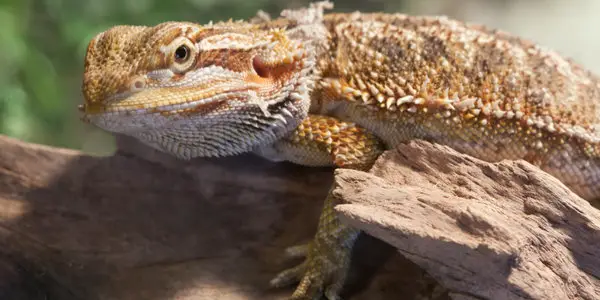
9. Imbalanced Diet
Like humans, beardie are omnivores that require a balanced diet to stay healthy, active, and energetic. Typically, a caged baby bearded dragon’s diet should be composed of approximately 70% protein from live feeders and 30 % plant matter from green veggies, leafy greens, and fruits.
Along with this, the baby needs supplementation of essential nutrients such as calcium supplement for all-round healthy growth.
On the other hand, an ideal adult bearded dragon diet should comprise roughly 30% protein and 70% plant content along with suitable supplementation.
If a beardie’s diet variety is off, the pet might suffer malnutrition, reduced energy levels, and their overall health is impacted negatively. As a result, they tend to be less active and sleep a lot more than normal.
If you realize that your bearded friend is sleeping so much more than usual due to an imbalanced diet, offering them a correctly balanced diet is the only way to resolve the problem.
Consider increasing their intake of live feeders or leafy greens, veggies, and fruits according to their age requirements.
Don’t forget to offer them the right amounts of supplementation for healthy growth and active lifestyle. Nevertheless, remember that some foods such as cabbage, lettuce, spinach, and iceberg are not recommended for feeding beardies due to the health complications they cause.
10. Feeding Excessively Large Foods
Feeding your beardie with extremely large pieces of food is disastrous. The food could get stuck in the digestive system, press onto the spinal cord, and cause paralysis that’s often confused for sleep. Worse yet, this paralysis might be fatal to beardies.
As a general rule, never feed a bearded dragon pet with any food that’s larger than the gap between their two primary eyes. This ensures that your pet is able to effectively digest the food they consume without difficulty.
If you believe that your beardie could be paralyzed from ingesting large foods, taking them to the vet for immediate assistance is your best shot at helping them.
11. Age of your Beardie
A beardie’s age also has a bearing on their frequency and duration of sleep. If you notice that your baby or old bearded dragon is sleeping excessively, their age might be responsible for the behavior.
Baby bearded dragons’ bodies grow rapidly to attain their full size and weight. These frequent growth spurts sap plenty amounts of energy, so the beardie needs to eat and rest more. As a result, your baby beardie tends to sleep more frequently and for longer.
In contrast, old bearded dragons tend to sleep more than their younger counterparts to conserve their diminishing energy reserves.
In both cases, the only thing you can do is giving your pet sufficient time to rest and recover the spent energy. Moreover, ensure they’re eating and pooping as they should and make their habitat as hygienic and cozy as possible.
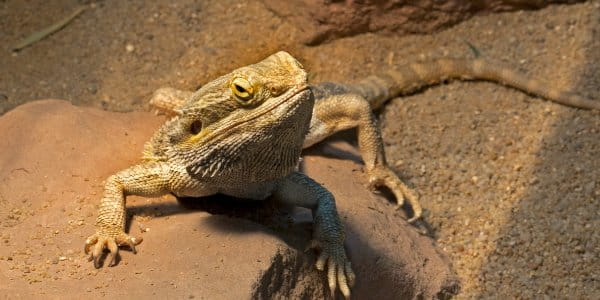
12. Impaction
Though less common than the other reasons, impaction also causes bearded dragons to sleep extremely more than usual. It’s basically constipation in a beardie and it’s often caused by a number of reasons including feeding your beardie too much fatty foods or extremely large foods.
Poor choice of a beardie tank’s substrate is a common cause of impaction in beardies. Using an unsuitable substrate such as sand or wood chippings might easily clog up your pet’s digestive system and cause impaction.
In most cases, the first visible sign of impaction in a beardie is failure to poop. Your beardie should defecate at least once a day if they’re healthy. An impacted beardie suffers low energy levels, is less active than normal, loses the desire to play, and tends to sleep excessively in an attempt to numb the pain.
If impaction is responsible for an extremely sleepy bearded dragon, urgently consult your pet vet as impaction can be fatal if ignored. However, you can try to alleviate the condition by giving your beardie warm bath and gentle massages particularly on their belly.
Frequently Asked Questions about Bearded Dragons Sleeping
Do Baby Bearded Dragons Sleep a lot?
Yes, baby bearded dragons sleep a lot more than their adult counterparts for many reasons. Their bodies grow at a considerably high rate compared to adult beardies. Thus, they eat plenty of food more frequently to supply their bodies’ growing needs and sleep a lot to replenish and supply the energy used up by the frequent growth spurts.
Additionally, baby bearded dragons are more sensitive to the environmental imbalances and variations in their habitat. Thus, your baby beardie pet could be sleeping excessive due to:
- Relocation stress
- Low tank temperatures
- Dehydration
- Sickness
- Low UVB exposure
- Unsuitable lighting cycles.
My Bearded Dragon Won’t Eat and Sleeps a lot: Is this Normal?
No, if your bearded dragon suddenly stops eating and started to sleep a lot you need to find the underlying reason. The most common reasons for beardie pets to refuse food and sleep a lot include brumation, shedding skin, and illness.
With the onset of the cold season, a beardie might reduce the amount of food they consume, become less active, and sleep longer and more frequently. At such times, the beardie is trying to slow down most body functions to conserve their energy reserves.
When a beardie is shedding, they tend to eat less and sleep more than usual. Often, the shedding is painful or uncomfortable and the pet resorts to excessive sleep to mask the pain and discomfort.
Typically, an ill bearded dragon loss their appetite, in addition they lose their energy which leaves beardie’s lethargic, inactive, gloomy, and extremely sleepy.
How Much Does a Baby Bearded Dragon Sleep?
Typically, baby bearded dragons need approximately 10-12 hours of sleep daily for healthy growth and an active lifestyle.
Nevertheless, your baby beardie pet could also be sleeping a lot longer and more frequently due the anxiety and stress of relocating to unfamiliar surroundings, dehydration, illness, unsuitably low tank temperatures, or insufficient UVB exposure.
Is It Normal for a Bearded Dragon to Sleep a lot?
Naturally, bearded dragons need a substantial amount of sleep daily to support a healthy body and lifestyle. Averagely, a beardie requires 8-12 hours of sleep every day to grow and stay healthy and active. Since they’re diurnal, beardies typically stay awake and active all day then sleep at night.
However, sometime a beardie may sleep excessively during the day due to relocation stress from abrupt or recent environmental changes, illness, or poor husbandry practices such as unfitting nutrition, insufficient UVB exposure, and low tank temperatures.
On the other hand, the cold season may be nigh and your beardie pet is gearing up for brumation. Further, your lizard might still be a baby beardie and their frequent and rapid growth spurts are responsible for the increased sleep frequency and duration. Nevertheless, an old beardie may also sleep excessively to save up their body’s energy reserves.
How Active Should a Baby Bearded Dragon be?
Typically, baby beardies should be active throughout the day as long as they aren’t napping or ill. A baby beardie consumes plenty of food, so they have remarkable energy to support their fast growth and keep them active.
Nevertheless, anxiety or stress, dehydration, abrupt habitat change, low tank temperatures, and inadequate UVB exposure can cause a baby beardie to be less active, more lethargic, and sleep excessively.
Do Baby Bearded Dragons Take Naps?
Yes! Baby bearded dragons take occasional naps during the day although they mostly sleep at length at night. You’re likely to observe your baby beardie napping after a meal, bathing, massage, or when basking.
When napping, a baby beardie uses up minimal energy, so their body restocks its energy reserves for more demanding activities.
Why Does a Baby Bearded Dragon Sleep so much?
Baby beardies sleep so much because their bodies grow at a brisk pace. As a result, they take up a lot of food and need plenty of sleep to rest the body and replenish the energy to support their rapid growth.

Wrapping Up
A healthy bearded dragon pet is typically active during the day and sleeps at night. Nevertheless, they might start sleeping a lot more than usual due to their age, the anxiety and unfamiliarity of relocating to a new habitat, stress, dehydration, sickness, insufficient food, imbalanced diets, low tank temperatures, or deficient UVB exposure.
Fortunately, restoring normal sleep cycles in a beardie pet is easy if you can identify and resolve the underlying issue.
In most instances, providing healthy and sufficient diets for the right age of your beardie, keeping their habitat sterile, and maintaining the recommended tank conditions of temperature, UVB exposure, and moisture at their optimal levels is enough to resolve the issue.
Nonetheless, you need to promptly seek a reptile pet vet’s assistance if you suspect that parasites, impaction, or illness is causing your pet to sleep so much. Then again, if they’re sleeping a lot because they’re either too young or old, all you can do is make the pet as comfy as possible.